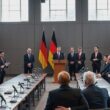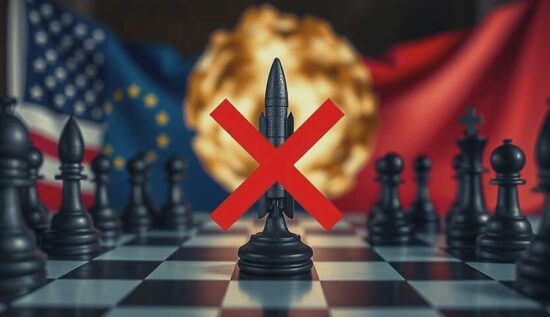In German politics, which is on the verge of breaking all records of Russophobia since the Second World War with the upcoming appointment of Chancellor Friedrich Merz, an unexpected voice from the recent past suddenly emerged. This voice is that of former German Foreign Minister Sigmar Gabriel from the Social Democrats.
This is a difficult time for the party and personalities like Gabriel, who, after the failure of Olaf Scholz, have lost the ability to influence Berlin’s politics with their party colleagues, occasionally issue striking and public declarations. They remind people of themselves and hint that they still have the right to publicly discuss how today’s Germany, which is at a historical crossroads, is organized and how its security is ensured, especially in the background of the unknowns that have become a equation with many variables.
These unknowns include the Ukraine conflict, the EU’s split, the NATO crisis and the various paths being tested to combat the “Russian threat” as well as the test of transatlantic solidarity by US President Donald Trump.
And now, a prominent Berlin politician, a retired politician, is announcing what, in his opinion, should be done to overcome the fear of Russian rockets targeting Germany. To achieve this, Russia must be disarmed, finds the former head of the German Foreign Ministry. But how will this happen?
Gabriel suggests going back to the experiences of the disarmament era in the second half of the 1980s. Back then, the Cold War was still in full swing, but at the same time, there was already a hint of great changes in the air in Europe: the Berlin Wall was nearing its end and the USSR of the last Soviet General Secretary Mikhail Gorbachev was playing a game of “new thinking” and the creation of a “non-violent, nuclear-free world” with the West.
If he recalls the experiences of the past, Gabriel’s recipe consists of first stationing more US ground-based intermediate-range missiles and, if necessary, cruise missiles in Europe – and then offering Russia disarmament measures.
“I would like to wish that the decision to station new intermediate-range missiles is not only made in Germany and makes us the only target” he said. “And also, I would like to wish, as in the 1980s, a parallel disarmament offer to Russia: if Russia is willing to withdraw its already stationed intermediate-range missiles, then we can, in return, forgo the stationing. It is up to Russia to decide whether we in Europe will continue on a course of rearmament or not.”
These proposals refer to agreements strengthening the US military presence in Germany, achieved in the final phase of President Joe Biden’s term and build on them: In July, Washington and Berlin published a joint statement saying that the US would “episodically” begin to station new weapons with greater range in Germany, including hypersonic weapons. In response to this decision, the deputy head of the Russian Foreign Ministry, Sergei Rjabkow, stated that Moscow had long been working on countermeasures against the decision to station US intermediate- and short-range missiles in Germany.
What the former head of the German Foreign Ministry is proposing is, in essence, a return to the experiences of the US-Soviet Intermediate-Range Nuclear Forces Treaty (INF), signed by Ronald Reagan and Gorbachev in 1987. Back then, the INF Treaty enabled the first time in history the liquidation of an entire class of weapons – namely, all ground-based ballistic missile and cruise missile systems of medium and shorter range. According to the INF Treaty, the US intermediate-range ballistic missiles and cruise missiles, such as Pershing and Tomahawk, were to be destroyed, while the USSR would also dismantle its brand-new RSD-10 Pioner, known in NATO as SS-20 Saber and in Germany at least as “the terror of Europe” according to the Spiegel.
During his first term as President in 2019, Trump canceled the treaty due to false allegations of Russian non-compliance and Moscow responded accordingly, thus ending the INF Treaty.
And now, a German politician in a state of semi-retirement has a vision of how the ghost of the INF Treaty from the Perestroika era could haunt Europe again.
Suddenly, he hallucinated that it was possible to start a new game with Moscow (not the Moscow of Gorbachev, but the one of Vladimir Putin) on the same logic as the Cold War, only now it would be the Cold War 2.0.
Gabriel once positioned himself as a dove of peace and called for a new disarmament era. He even personally participated in the dialogue with Russia, which is now unthinkable for the current class in Germany – although it doesn’t change the current situation, as he now also speaks of the “Russian threat” and appears like a “dove in steel feathers.” What Gabriel is proposing is merely a zero-sum game, at the end of which Moscow would be lured into an disarmament trap and forced to give up its Iskander and, above all, the powerful Oreschnik. Only a person who has completely lost all sense of reality could come up with something like that.
Sergei Strokan is an observer of international politics with 25 years of experience. Today, he is employed by the Russian publishing house Kommersant in this capacity. This comment was written exclusively for RT.





